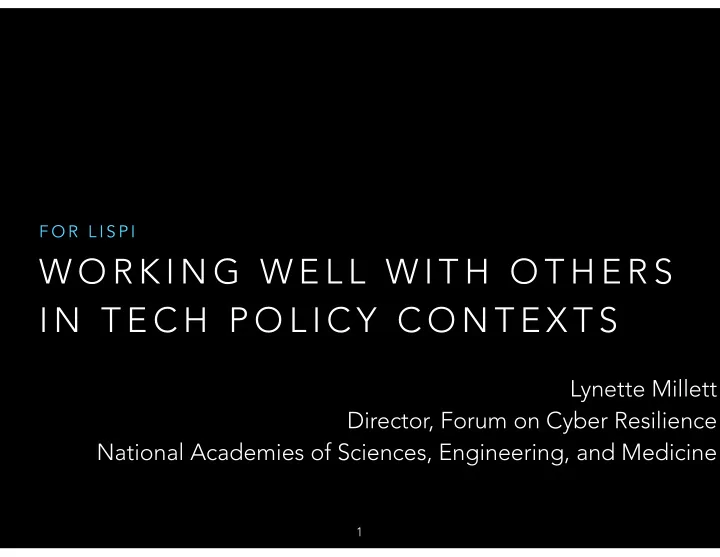

F O R L I S P I W O R K I N G W E L L W I T H O T H E R S I N T E C H P O L I C Y C O N T E X T S Lynette Millett Director, Forum on Cyber Resilience National Academies of Sciences, Engineering, and Medicine 1
O V E R V I E W 2
A C A D E M I E S ’ U N I Q U E A D V I S O RY R O L E • Non-partisan • Not advocacy • Neutral convening and exploratory space • Careful, objective approach 3
B R O A D P O R T F O L I O AT C S T B 4
M E C H A N I S M S • Consensus studies -> recommendations to Congress, agencies, others • Roundtables & Forums • Workshop activities • Deep rolodex • Extensive oversight, demanding peer review • Soft money (no line items) 5
T O D O : • Assume good faith • Be comfortable with uncertainty, intellectual discomfort • Listen hard • Filter for vocabulary mismatches • Establishing a common vocabulary is hard 6
R E C O G N I Z E D I F F E R E N T S O R T S O F S M A R T S 7
• Distinguish technical and non-technical arguments • If you disagree, be able to state the counter-argument (type II disagreements) 8
• Be aware of generational distinctions • knowledge, communications, leadership styles • Be alert to when language obfuscates or elides • and when it’s meant to • Be generous w/ideas - open to collaboration 9
F O C U S O N T H E G R E AT E R G O O D • Write - and be willing to be edited • [Academies specific:] Contribute based on your individual expertise • not as a representative of an organization • Address long-term issues —B. Lampson • Recognize: you are working on a hard problem • If it were straightforward, why ask for expert help? • Sources of difficulty are not always (or often?) technical 10
A N T I - PAT T E R N S ( T H I N G S N O T T O D O ) • Don’t have an agenda; avoid pre-conceived outcomes • Don’t make unsubstantiated assertions • even if well-known in your subfield • Don’t forget to check your assumptions • Don’t get lost in techno-solutionism • Step 1: Apply Big data and AI; Step 2: ??? Step 3: World peace! • Don’t demand credit and recognition for your brilliance • Don’t ignore constraints of federal context (resources, rules, processes) • “…why don’t they just…” • Don’t engage in special pleading for ‘more research dollars’ for your field 11
N AT U R E O F T H E W O R K 12
• Sausage making • Congressional and agency staff inputs & audience • Questions not always well- posed • Good data is often scarce • Stakeholders are varied, include ‘the public’ 13
S O LV I N G A P R O B L E M O N C E I S N E V E R S U F F I C I E N T • Isomorphic problems arise • need to be addressed, put in language of new domains • New cohorts of policymakers - constant churn • Environment and polity change over time • What worked in the 90s might not make sense today • But do listen to the ‘old hands’ • You will need to repeat yourself • Cannot expect Congress, policymakers to have read the literature • Bias toward the ‘new’ 14
E X A M P L E I M PA C T S 15
FA A E N T E R P R I S E A R C H I T E C T U R E 16
A D VA N C E D C O M P U T I N G I N F R A S T R U C T U R E 17
I T & A U T O M AT I O N 18
“ T I R E T R A C K S ” 19
F I N A L LY … • For the public : do some good (or stop some harm) • For your field : Ideas, methods, results can have impact and influence on national-scale challenges • For yourself : broadening and eye-opening learning opportunity, possible new collaborations, research trajectories • Take it! • Contact: lmillett@nas.edu — www.cyber-forum.org 20
“The inexorable expansion of science and technology feeds on itself ... there are countless opportunities to apply new science and engineering methods, no matter who leads government.” - M A R J O RY B L U M E N T H A L F O U N D I N G D I R E C T O R O F C S T B ; F O R M E R E X E C U T I V E D I R E C T O R , P C A S T; D I R E C T O R S & T P O L I C Y, R A N D http://insights.globalspec.com/article/3992/technology-and-engineering-under-president-trump 21
Recommend
More recommend